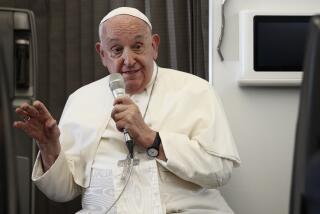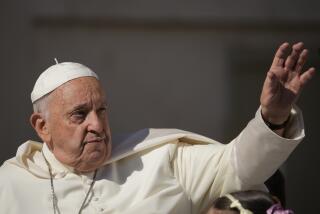THE PAPAL VISIT : Pope Extends Gesture of Friendship to Jews : Exhorts Americans to Follow Traditional Values of Morality
- Share via
COLUMBIA, S.C. — Pope John Paul II made moving gestures of friendship to American Jews and unity to Protestants during an arduous three-city round of appearances Friday, and bluntly exhorted all Americans to restore traditional moral values to their lives and to reawaken a sense of moral accountability in society.
In Miami’s Tamiami Park, a thunderous rainstorm forced the pontiff to cut short the first public Mass of his American visit, much to the disappointment of the 230,000 who had gathered there. It was believed to be the first time in John Paul’s 36 foreign tours that a Mass was interrupted by the weather.
The Pope was forced to occasionally speak from under the shelter of an umbrella held by an altar boy as he stood atop a three-story altar erected under sail-like canopies.
Expects Obedience
His sermon, which was preceded by a special greeting to “Cubans, Haitians, Nicaraguans and others from Central America and the Caribbean,” made it clear that he expects backsliding American Catholics to obey the church’s traditional teachings concerning sexual morality.
“Family life is subjected to powerful pressures as fornication, adultery, divorce and contraception are wrongly regarded as acceptable by many,” he said before electrical failure and Secret Service concerns for his safety and that of his listeners forced him to curtail the Mass. “The unborn are cruelly killed and the lives of the elderly are in serious danger from a mentality that would open the door wide to euthanasia.”
Meeting 200 prominent American Jews at Miami’s Dade County Cultural Center earlier Friday morning, John Paul significantly embraced the horror of Jewish suffering in the Nazi Holocaust and drew sustained applause when he repeated the modern Jewish refrain: “Never again!”
The pontiff spoke warmly of Israel and the Jews’ right to a homeland there. But he also reiterated his longstanding support for Palestinian rights.
“What has been said about the right to a (Jewish) homeland also applies to the Palestinian people, so many of whom remain homeless and refugees,” John Paul told the Jewish audience. “While all concerned must honestly reflect on the past--Muslims no less than Jews and Christians--it is time to forge those solutions which will lead to a just, complete and lasting peace in that area.”
Although the Pope has spoken often of Palestinian rights, it was the first time in the memory of Vatican observers that he had done it so specifically before a Jewish audience. The remark was greeted with silence, but one Jewish leader at the meeting, Arthur Teitelbaum of the Anti-Defamation League of B’nai B’rith, said that the audience “did not view it as hostile commentary.”
But there was overwhelming approval of John Paul’s deeply emotional lamentation of the Nazi Holocaust, which he called “that ruthless and inhuman attempt to exterminate the Jewish people in Europe, an attempt that resulted in millions of victims--including women and children, the elderly and the sick--exterminated only because they were Jews.”
The remark represented a slight but significant shift in the Vatican point of view, which Jewish leaders have often complained trivialized Jewish suffering by claiming the Holocaust was aimed at mankind in general and not specifically at Jews.
Greeting the Pope on the occasion of the opening of a display of 57 rare Judaic documents from the Vatican Library at the Cultural Center, Rabbi Mordecai Waxman of the Synagogue Council of America noted that differences with the Pope over his controversial June meeting with Austrian President Kurt Waldheim have not been resolved.
Cites Progress
But the rabbi, who led a group of nine Jewish leaders in private talks with the pontiff last week in Italy, said John Paul’s willingness to listen to their “pain and anger” over the affair “represents an important confirmation of the progress our communities have made in recent decades.”
“We are encouraged by your vigorous leadership in denouncing all forms of anti-Semitism,” Waxman said.
The traveling Pope’s five-hour stop in Columbia, in the heart of the Southern Bible Belt, focused on ecumenical contacts--the continuing search for unity among widely separated Christian sects. While such meetings are a routine part of every papal pilgrimage abroad, the meeting here with American Protestant and Orthodox leaders was unusual because it involved so many more denominations than his previous ecumenical gatherings.
The group of 27 leaders with whom John Paul met privately at the president’s house on the campus of the University of South Carolina included Presbyterians, Baptists, Lutherans, Episcopalians, Methodists, Disciples of Christ, Greek Orthodox, Armenian Apostolic, Antiochian Orthodox, Polish National Catholics and representatives of the African Methodist Episcopal Church, United Church of Christ and United Church Women.
But while his speech reiterated the Vatican’s expressed commitment to ecumenical dialogue and unity, the Pope broke no new ground concerning doctrinal and dogmatic differences that still hold the majority of Protestants away from Rome. Among the knottiest obstacles are the Catholic refusal to share Holy Communion with non-Catholics and to recognize Protestant clergymen as validly ordained.
Even so, the Pope told them, “it is no small achievement of the ecumenical movement that after centuries of mistrust, we humbly and sincerely recognize in each other’s communities the presence and fruitfulness of Christ’s gifts at work. . . .”
Vie for Attention
On the streets of Columbia, Bible students and street preachers of every stripe vied for the attention of the smaller-than-anticipated crowds waiting for the Pope’s motorcade. Some passed out literature calling the pontiff a false leader. Others warned of the Apocalypse and the anti-Christ.
That the Pope’s followers appeared to be outnumbered underscored the place of the Roman Catholic Church in the South, where Catholics make up less than 4% of the population.
In recent weeks, there had been numerous local newspaper reports suggesting that as many as 500,000 people might spill into this city of 100,000 for the motorcade that took the Pope to Williams-Brice Stadium on Friday evening, where he presided over an ecumenical church service.
However, 90 minutes before the parade was to begin along a seedy, semi-rural stretch of Assembly Street, there were only a few hundred people standing in the punishing late afternoon sun and humidity. It was the second time in two days that the anticipated crowds for the Pope’s motorcade did not materialize. On Thursday, lighter-than-expected crowds were reported along the motorcade route in Miami.
Evelyn Padgett, 46, and Julia Mims, 58, both of Columbia, took up parade-watching spots four hours ahead of time, but it was not the Pope they were interested in seeing.
“We came to see his cute little car,” said Mims, referring to the Popemobile.
“You bet,” added Padgett defiantly. “I’m a full-blooded Baptist.”
At Jack’s Party Shop, a small red-brick bar a few blocks away from the stadium, six men stood outside nursing cold beers. “He ain’t no better than Billy Graham,” said Robert Holland, 34, sourly. “Graham is our man and he’s from the South.”
Priest Muttering
Father Philip Scott, a Catholic priest from Atlanta, was trudging down the highway on his way to the stadium, dressed in black vestments and moping his brow, muttering about the lack of interest.
“I hope the Pope is thinking about this because he can see what it’s like to be a Catholic in the South,” Scott said. “This is still missionary country for us.”
Despite the light turnout along the parade route, the 72,400-seat stadium was nearly full for the ecumenical prayer service conducted by the Pope. The crowd had waited in the hot sun for nearly five hours before the pontiff arrived.
Many of the spectators were dressed in the papal colors of yellow and white and wore lapel badges that said: “U.S. Roman Catholics Love John Paul II,” with a big red heart in place of the word “love.” Hanging from an upper tier of the open-air stadium was a large homemade banner reading: “Carolina Loves Karola.”
The pontiff’s call for Christian unity struck a responsive chord in many of the spectators.
“You go to a Southern Baptist service and a Catholic service and, whether the clergymen are standing up there in a suit and tie or in robes, they’re both talking about the same thing--the 10 Commandments,” said Sundru Smith, a Catholic from Goose Creek, S.C., who is married to a Southern Baptist.
“If my husband and I can live in one house for 20 years without war, why can’t Catholics and Protestants live together in peace all over the world?”
The service was preceded by a program featuring Scripture readings, music and narration by actors Richard Thomas, MacDonald Carey, Bonita Granville, Michael Keaton and Jane Wyatt.
This was followed by a procession of Christian ministers and Catholic clergy in a variety of flowing and often colorful vestments down both sides of the field.
The Pope’s 30-minute homily was frequently punctuated by enthusiastic applause. The greatest burst of applause came when he said: “America, you cannot insist on the right to choose, without also insisting on the duty to choose well, the duty to choose the truth.”
To the largely non-Catholic stadium crowd, he pleaded for the sanctity of marriage and the family. “Contemporary society has a special need of the witness of couples who persevere in their union, as an eloquent, even if sometimes suffering ‘sign’ in our human condition of the steadfastness of God’s love,” John Paul said.
Then he added: “Our Christian conscience should be deeply concerned about the way in which sins against love and against life are often presented as examples of ‘progress’ and emancipation.” Instead, he said, they are “age-old forms of selfishness dressed up in a new language. . . .”
He asked for a reawakening of “moral accountability” and said: “It would be a great tragedy for the entire human family if the United States, which prides itself on its consecration to freedom, were to lose sight of the true meaning of that noble word.”
After the pontiff’s sermon, nine of the Christian leaders each gave an intercessory prayer. The Lord’s Prayer was then recited by the entire stadium as the spectators linked hands and held them over their heads.
After the service, the Pope met briefly at the Columbia airport with former President Jimmy carter and his wife, Rosalynn. He then flew to New Orleans, where this morning his schedule includes a youth rally and a meeting with black Catholic leaders at the Superdome.
Louis Sahagun in Columbia, S.C., and Bob Baker in Los Angeles contributed to this story.
More to Read
Sign up for Essential California
The most important California stories and recommendations in your inbox every morning.
You may occasionally receive promotional content from the Los Angeles Times.










